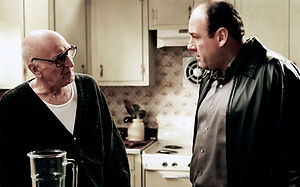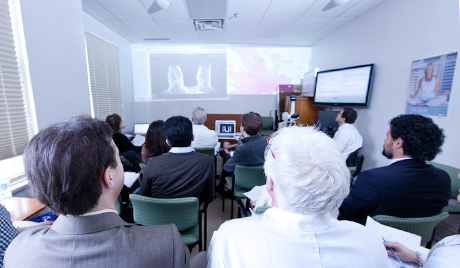Second Opinion
 Many years ago, during the third season of The Sopranos, Uncle Corrado “Junior” Soprano has surgery for a stomach (gastric) tumor. As he is being put under anesthesia he has a dream about his nephew, Tony Soprano getting indicted and Junior is free from the Feds and free of cancer.
Many years ago, during the third season of The Sopranos, Uncle Corrado “Junior” Soprano has surgery for a stomach (gastric) tumor. As he is being put under anesthesia he has a dream about his nephew, Tony Soprano getting indicted and Junior is free from the Feds and free of cancer.
The surgery scene has a part where the surgeon sends a piece of the stomach margin for frozen section to see if he has resected around the tumor and has a margin of normal tissue. The pathologist reads back the frozen section diagnosis, mentioning that this was essentially preliminary and all sections from the tumor and surrounding normal tissue would have to be examined on permanent sections. The surgeon starts to get irritated and the pathologist tells him it’s “clean”.
After the surgery, on final pathology review, there is apparently nodal involvement and there is still tumor in the patient. There is some additional discussion about re-operating, doing what the surgeon calls “amended surgery” to remove the remaining malignant cells. The patient is concerned about a second surgery and/or the prospect of chemotherapy and he thinks his surgeon, Dr. Kennedy, has “the hands of an angel” (and so does the surgeon) and with a last name like Kennedy, how wrong could he be about a second surgery? Tony gets concerned and asks if there “Isn’t a you people could just agree?” There is mention of “convening a tumor board” where there is “a meeting of the chief of oncology, an oncological pathologist and other specialists who then work together to reach a consensus.”
One of the next scenes shows a hospital conference room with the surgeon, pathologist, oncologist and others discussing and debating the case, the surgeon yelling with the pathologist and a consensus to treat the remaining tumor with chemotherapy, based on the histology, nodal status and the patient’s performance status and ability to withstand a second surgery.
This of course is entirely fictional. There is no such thing as the mafia.
 The story of the tumor board is essentially accurate. Specialists discuss treatment decisions pre or post-operatively to arrive at best clinical business practices. They are a requirement for cancer center accreditation.
The story of the tumor board is essentially accurate. Specialists discuss treatment decisions pre or post-operatively to arrive at best clinical business practices. They are a requirement for cancer center accreditation.
While the surgeon wants to operate he would rather not deal with an onologist “looking over his shoulder” while he does so and concedes to additional treatment with chemotherapy where we see the surgeon in the infusion center speaking with Uncle Junior after he was intimidated on a golf course by Tony and Furio, a “business associate”.
Again, this is totally fictional as there is no such thing as the mafia, but what happened as a result of the tumor board being “convened” is real.
Providers discuss their view points from the part of the case within the subspecialty they are a part of. Surgeons, pathologists, radiologists, radiation oncologists and medical oncologists all report their findings and make an argument on what should be done next within the continuum of care on a case by case basis using evidence-based medicine, clinical protocols, research protocols, if available, and a twist of their own anecdotal experience with similar patients, pathology and what happened to those patients with particular treatment regimens.
While a second surgery for nodal disease (positive lymph nodes – metastatic disease) would not be indicated and chemotherapy would be regarded as appropriate therapy, the surgeon ultimately didn’t want to arm wrestle with the oncologist over who was “right”. Sometimes there is not a definitive consensus, ½ the room may vote for “watch and wait”, ½ the room may vote for surgery and ½ the room may vote for biopsy to see what a small nodule in the lung or liver might be before doing nothing or something. That’s too many halves but you get the idea.
And perhaps the opinions and split vote may go another way in another hospital or medical school, based on those specialists collective clinical knowledge when that patient is discussed.
It is not a perfect system but often times a second opinion, or a third opinion, or a group discussion and meeting of the minds, much like a mafia “sit down” to settle a matter provides the best possible outcome for the patient, if not necessarily what a particular provider would do thinking independently or thinking he/she knows what is best for the patient.
Do we always do what is best for the patient or what we think is best for the patient?
































